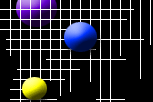|
Scientific Tutoring is founded on the socratic method which encourages independent thinking. After all, the student won't
have someone there to aid him during exams. By asking gentle questions to help solve problems, student's answers lead them
closer to the current solution. Eventually, the student discovers the correct solution and experiences that great "ah,
ha" feeling. Aligned with the Scientific Tutoring philosophy, the tutor does not teach, but merely guides the student's
thinking through the use of questions.
Other methods to improve learning include "summarizing" and "what-if"
problems. Students may be asked to summarize how they solved the problem and what they learned after the problem is completed.
This is especially useful for very long problems because students need to see the big picture and how their thinking leads
to the next stage of the problem.
"What-if" questions are also very helpful. These questions take a current
math or science problem (for example, a math problem) and are phrased in another way. Since a great deal of problems which
appear in high school and college exams are just permutations of a general class of problems, students who realize these different
kinds should do better on exams.
|

